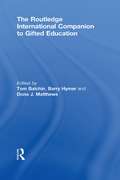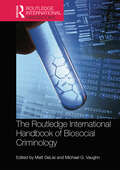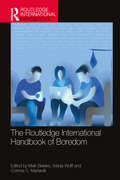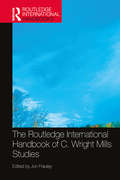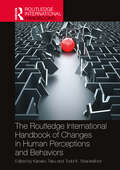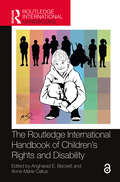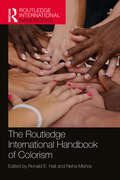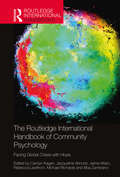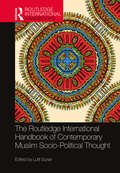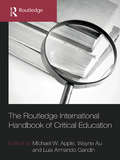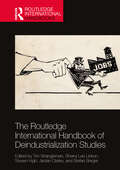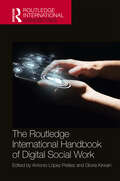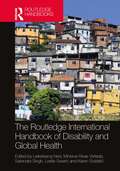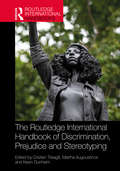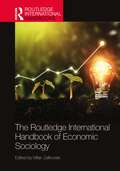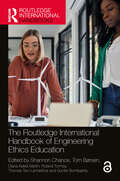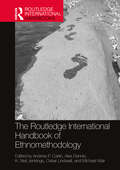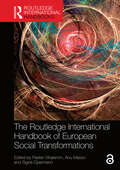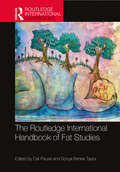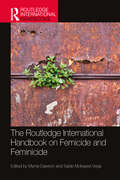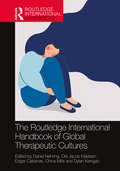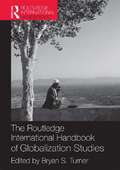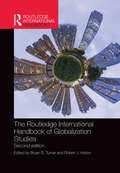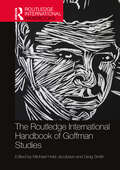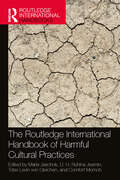- Table View
- List View
The Routledge International Companion to Gifted Education
by Barry Hymer Tom Balchin Dona J. MatthewsThe Routledge International Companion to Gifted Education is a ground-breaking collection of fully-referenced chapters written by many of the most highly-respected authorities on the subject from around the world. These fifty contributors include distinguished scholars who have produced many of the most significant advances to the field over the past few decades, like Joseph Renzulli and Robert Sternberg, alongside authorities who ask questions about the very concepts and terminology embodied in the field – scholars such as Carol Dweck and Guy Claxton. This multi-faceted volume: highlights strategies to support giftedness in children, providing ideas that work and weeding out those that don’t; is written in jargon-free language in an easy-to use themed format; is the most authoritative collection of future-focused views, ideas and reflections, practices and evaluations yet produced; includes chapters dealing with the major controversies and concerns in the field today, from the problems of identification to changing understandings of giftedness and creativity. The international aspect of the Companion, and its juxtaposition of points of view – whereby chapters are deliberately positioned and accompanied by editorial commentary to highlight the contrasts with each other – ensures that different views are addressed, allowing the reader to absorb and reflect upon the many perspectives on each issue. The Companion is a guide to the new ideas and controversies that are informing gifted education discussion and policy-making around the world. It is a first class resource to students and researchers alike.
The Routledge International Handbook of Biosocial Criminology (Routledge International Handbooks)
by Matt DeLisi; Michael G. VaughnBiosocial criminology is an interdisciplinary field that aims to explain crime and antisocial behavior by exploring both biological factors and environmental factors. Since the mapping of the human genome, scientists have been able to study the biosocial causes of human behaviour with the greatest specificity. After decades of almost exclusive sociological focus, criminology has undergone a paradigm shift where the field is more interdisciplinary and this book combines perspectives from criminology and sociology with contributions from fields such as genetics, neuropsychology, and evolutionary psychology. The Routledge International Handbook of Biosocial Criminology is the largest and most comprehensive work of its kind, and is organized into five sections that collectively span the terrain of biosocial research on antisocial behavior. Bringing together leading experts from around the world, this book considers the criminological, genetic and neuropsychological foundations of offending, as well as the legal and criminal justice applications of biosocial criminological theory. The handbook is essential reading for students, researchers, and practitioners from across the social, behavioural, and natural sciences who are engaged in the study of antisocial behaviour.
The Routledge International Handbook of Boredom (Routledge International Handbooks)
by Maik Bieleke Wanja Wolff Corinna S. MartarelliThis comprehensive text is a unique handbook dedicated to research on boredom. The book brings together leading contributors from across three continents and numerous fields to provide an interdisciplinary exploration of boredom, its theoretical underpinnings, its experiential properties, and the applied contexts in which it occurs.Boredom is often viewed as a mental state with little utility, though recent research suggests that it can be a powerful motivator of human behavior that shapes our actions in many ways. The book examines boredom from a range of perspectives and is comprised of three parts. Part I delves into the theoretical approaches to boredom, presenting methods for its measurement, explaining when and why boredom occurs, and scrutinizing the impact it has on our behavior. Part II focuses on the psychological and neural properties of boredom and its associations with a multitude of mental and interpersonal processes, such as self-control, mind-wandering, flow, and aggression. Part III presents boredom in practical contexts like school and work, and sheds light on its role for health-related behaviors, psychosocial well-being, and aesthetic experiences. The book concludes by summarizing the state of boredom research, identifying promising areas for future research, and providing directions for how research on boredom can be advanced. As the authoritative book on boredom, this handbook is an essential resource for students and researchers of psychology, sociology, education, sport science, and computer science.
The Routledge International Handbook of C. Wright Mills Studies (Routledge International Handbooks)
by Jon FrauleyThe Routledge International Handbook of C. Wright Mills Studies brings together leading scholars of the work of radical sociologist C. Wright Mills to showcase its impact across the social sciences. Showing how Mills’ thought can be taken up - and in some cases, sympathetically reformulated - to tackle problems of power and politics, it presents an authoritative state-of-the-art overview of Mills’ groundbreaking ideas and his far-reaching theoretical and methodological impact. Crucially, the volume also illustrates the value of thinking with Mills in addressing the complexities of contemporary capitalist democracies. As such, it will appeal to scholars of sociology, anthropology, organization studies, peace and conflict studies, criminology, politics and public administration.
The Routledge International Handbook of Changes in Human Perceptions and Behaviors (Routledge International Handbooks)
by Todd K. Shackelford Kanako TakuThe Routledge International Handbook of Changes in Human Perceptions and Behaviors is the first edited volume to present multidisciplinary perspectives on various aspects of changes that humans experience.The handbook is designed to highlight the different contents, types, ways, meanings, applications, and moments of changes that have been recognized by experts in various fields within the life and social sciences. Comprised of four sections, the chapters address changes in a variety of contexts related to human perceptions and behaviors; the moment of change and fluctuations; changes in applied settings; and the meaning of changes, including resistance to change. Written by a range of expert international contributors, the book brings together discussions and insights about how different levels and types of changes in human perceptions, attitudes, beliefs, values, and behaviors have been studied and considered in diverse fields. It also explores the various mechanisms that account for changes, exploring how and when changes occur and what changes mean to humans.Relevant for empirical and theoretical work, the handbook will be of great interest to researchers, academics, and postgraduate students across psychology, behavioral sciences, and social sciences.
The Routledge International Handbook of Children's Rights and Disability (Routledge International Handbooks)
by Angharad E. Beckett Anne-Marie CallusThis handbook provides authoritative and cutting-edge analyses of various aspects of the rights and lives of disabled children around the world. Taking the UN Convention on the Rights of Persons with Disabilities (CRPD) and the UN Convention of the Rights of the Child (CRC) as conceptual frameworks, this work appraises the current state of affairs concerning the rights of disabled children across different stages of childhood, different life domains, and different socio-cultural contexts. The book is divided into four sections: Legislation and Policy Children’s Voice The Life Course in Childhood Life Domains in Childhood Comprised of 37 newly commissioned chapters featuring analyses of UN documents and case studies from Australia, Brazil, Ethiopia, Hong Kong, Italy, the Netherlands, Norway, Papua New Guinea, Serbia, South Africa, Spain, Sweden, the United Kingdom, the United States, and Vanuatu, its multidisciplinary approach reflects the complexities of the lives of disabled children and the multifarious nature of the strategies needed to ensure their rights are upheld. It will be of interest to researchers and students working in disability studies, education, allied health, law, philosophy, play studies, social policy, and the sociology of childhood. It will also be a valuable resource for professionals/practitioners, allowing them to consider future directions for ensuring that disabled children’s rights are realised and their well-being and dignity are assured.
The Routledge International Handbook of Colorism (Routledge International Handbooks)
by Ronald E. Hall Neha MishraThis timely and unique edited book explores the concept of colorism, which is discrimination based on the color of a person’s skin. It takes a global approach that draws on authentic voices from varied contexts and is dedicated to exploring and enriching the diverse intellectual discourse on colorism.The book explores colorism across the globe and studies how it has been woven into the cultural fabric of communities of color. With 22 chapters organised geographically into parts representing six continents, it looks at various facets of colorism, offering international insights beyond a Western perspective. The handbook examines policy-making in the sphere of colorism internationally and across countries, and provides thoughtful insights on colorism discrimination in different contexts. Chapters are written by leading experts from different disciplinary backgrounds who present cutting-edge research on the topic of colorism in different country contexts, contributing to a global dialogue on colorism.The Routledge International Handbook of Colorism comprehensively highlights colorism and skin color bias which blurs the national and international boundaries. It will be fascinating reading for students and academics in psychology, social work, education, criminal justice and other social sciences. It will also be of interest to those working in areas relating to marginalization, human rights, diversity and inclusion.
The Routledge International Handbook of Community Psychology: Facing Global Crises with Hope (Routledge International Handbooks)
by Carolyn KaganThis handbook offers a unique critical and cross-disciplinary approach to the study of Community Psychology, showing how it can address the systemic challenges arising from multiple crises facing people across the world. Addressing some of the most pressing issues of our times, the text shows how Community Psychology can contribute to principled social change, giving voice, enabling civic participation and supporting the realignment of social and economic power within planetary boundaries. Featuring a collaboration of contributions from world-leading academics, early career researchers and community leaders, each chapter gives theory and context with practical examples of working with those living in precarious situations, on matters that concern them most, and highlights positive ways to contribute to progressive change. The editors examine economic, ecological, demographic, gender, violence, energy, social and cultural, and political crises in relation to psychological theories, as well as public policy and lived experiences, presenting an approach situated at the intersection of public policy and lived experiences. Viewed through four different perspectives or lenses: a critical lens; a praxis lens; an ecological lens and a reflective lens, this compendium of critical explorations into Community Psychology shows how it can contribute to a fairer, more just, resilient and sustainable world. Also examining the lessons learnt from the COVID-19 pandemic about the pervading nature of social inequality, but also the potential of solidarity movements ranging from local to international levels, this is ideal reading for undergraduate and postgraduate students and scholars in Community Psychology and related areas, including social psychology, clinical psychology and applied psychology.
The Routledge International Handbook of Contemporary Muslim Socio-Political Thought (Routledge International Handbooks)
by Lutfi SunarThis volume unfolds the ebbs and flows of Muslim thought in different regions of the world, as well as the struggles between the different intellectual discourses that have surfaced against this backdrop. With a focus on Turkey, Egypt, Iran and the Indian subcontinent – regions that, in spite of their particular histories and forms of thought, are uniquely placed as a mosaic that illustrates the intertwined nature of the development of Muslim socio-political thought – it sheds light on the swing between right and left in different regions, the debates surrounding nationalism, the influence of socialism and liberalism, the rise of Islamism and the conflict between state bureaucracy and social movements. Exploring themes of civil society and democracy, it also considers current trends in Muslim thought and possible future directions. As such, it will appeal to scholars across the fields of sociology, anthropology, political science, history and political economy, as well as those with interests in the study of religion, the development of Muslim thought, and the transformation of Muslim societies in recent decades.
The Routledge International Handbook of Critical Education (Routledge International Handbooks of Education)
by Michael W. Apple Wayne Au Luis Armando GandinThe Routledge International Handbook of Critical Education is the first authoritative reference work to provide an international analysis of the relationship between power, knowledge, education, and schooling. Rather than focusing solely on questions of how we teach efficiently and effectively, contributors to this volume push further to also think critically about education's relationship to economic, political, and cultural power. The various sections of this book integrate into their analyses the conceptual, political, pedagogic, and practical histories, tensions, and resources that have established critical education as one of the most vital and growing movements within the field of education, including topics such as: social movements and pedagogic work critical research methods for critical education the politics of practice and the recreation of theory the freirian legacy. With a comprehensive introduction by Michael W. Apple, Wayne Au, and Luis Armando Gandin, along with thirty-five newly-commissioned pieces by some of the most prestigious education scholars in the world, this Handbook provides the definitive statement on the state of critical education and on its possibilities for the future.
The Routledge International Handbook of Deindustrialization Studies (Routledge International Handbooks)
by Stefan Berger Steven High Tim Strangleman Jackie Clarke Sherry Lee LinkonThe Routledge International Handbook of Deindustrialization Studies is a timely volume that provides an overview of this interdisciplinary field that emerged in response to the widespread decline of manufacturing and heavy industry from the 1980s onward. Edited by prominent figures in the field, the volume brings together many of the leading scholars from a range of countries across the globe to offer a multifaceted overview of deindustrialization and its impact. Deindustrialization has been cited as one of the factors behind the rise of the far right, and to a lesser extent the far left, across Europe, the rise and success of Trumpism in the US, and the Brexit vote as well as the more recent and sudden erosion of UK Labour’s ‘Red Wall’ of the North of England. This collection brings together scholars of deindustrialization around the globe and from a wide variety of academic disciplines including history, sociology, politics, geography, economics, anthropology, literature, arts practice, photography, heritage, and cultural studies. In doing so, the volume explores the roots of deindustrialization across the world, highlights the key themes and issues in the field, illustrates the intersectional and interdisciplinary character of the field, and shows how deindustrialization lies at the heart of many of the key political, cultural, social, and economic issues of our time.Written in a clear and accessible style, the Handbook is a comprehensive interdisciplinary volume for this young but maturing field. The volume is a valuable resource for students, teachers, and researchers interested in industrial decline, closure, and the multifaceted impacts they cause. It speaks to readers across the arts, humanities, and social and political sciences concerned with deindustrialization broadly defined.
The Routledge International Handbook of Digital Social Work (Routledge International Handbooks)
by Antonio López Peláez Gloria KirwanThis handbook provides an authoritative and cutting-edge overview of current research and trends related to the emerging field of digital technology and social work. This book is divided into six sections: Part 1 Reframing Social Work in a Digital SocietyPart 2 Shaping a Science of Social Work in the Digital SocietyPart 3 Digital Social Work in PracticePart 4 The Ethics of Digital Social WorkPart 5 Digital Social Work and the Digitalization of Welfare Institutions: Opportunities, Challenges and Country CasesPart 6 Digital Social Work: Future Challenges, Directions and Transformations This book, comprised of 40 specially commissioned chapters, explores the main intersections between social work theory and practice in an increasingly digitized world. Bringing a critical focus to how social work as a profession is adapting exponentially to embrace the benefits of technology, it gives specific consideration to the digitalization of the social work profession, including the ways in which social workers are using different forms of technology to provide effective services and innovative practice responses. With chapters on big data, digital archiving, e-citizenship and inclusion, gerontechnology, children and technology, and data ethics, this book will be of interest to all social work scholars, students and professionals as well as those working in science and technology studies more broadly.
The Routledge International Handbook of Disability and Global Health (Routledge International Handbooks)
by Leslie Swartz Karen Soldatić Lieketseng Ned Minerva Rivas Velarde Satendra SinghThis handbook will raise awareness about the importance of health and well-being of people with disabilities in the context of the global development agenda: Leaving No-one Behind.There has been a growing discussion on how people with disabilities should be included in the global health landscape. An estimated one billion people have some form of disability, 80% of whom live in low- and middle-income settings. People with disabilities are more likely to be poor, with restricted access to health and social services, education, rehabilitation and employment. Despite this, people with disabilities are often overlooked in global health and development efforts. Furthermore, the COVID-19 pandemic has shown that unless systematically planned for and included in policies and programmes, people with disabilities remain at an increased risk of being adversely affected in times of humanitarian crisis and emergency disasters.Divided into eight sections: Disability and Health Frameworks Health Justice, Rights and Bioethics Gendering Disability Health Disability and Global Mental Health Disability and Access to Healthcare, Including Workforce Development Crises and Health Technology and Digital Health Disability, Ageing and Dementia Care This handbook covers the full range of topics pertaining to disability and global health including inclusive health; access to rehabilitation; global mental health and disability; medical training and disability; community based inclusive development for improving health and rehabilitation; maternal health and sexual reproduction; preventive care and health promotion for people with disabilities; health, disability and indigenous knowledges; bioethics and human rights; data protection; and health in the global south.It will be of interest to all scholars, students and professionals working in the fields of disability studies, health studies, nursing, medicine, allied health, development studies and sociology.
The Routledge International Handbook of Discrimination, Prejudice and Stereotyping (Routledge International Handbooks)
by Cristian Tileagă Martha Augoustinos Kevin DurrheimThis handbook explores prejudice, stereotyping and discrimination primarily as phenomena embedded in the social organization of societies and connected to structural factors and larger societal systems. It offers a unique critical and cross-disciplinary approach to the study of contemporary manifestations of prejudice, stereotyping and discrimination. New socio-psychological analyses of the most pressing social problems of our age bring into view future directions of research on prejudice, stereotyping and discrimination oriented to social change and collective action and that engage with wider systems of norms and discourse. The editors draw on social psychology, sociology, social policy, clinical psychology, cultural studies and feminist, antiracist and decolonizing social science to show how social psychology can successfully rekindle its intellectual dialogue with kindred social science fields to create broader foundations for the exploration of the paradoxes lodged at the heart of the social expression of prejudice in liberal democracies. This is essential reading for anyone interested in prejudice, discrimination and stereotypes. The handbook will be of interest to academics and researchers exploring both the quantitative and qualitative aspects of discrimination, inequality and social exclusion, as well as students undertaking masters or doctoral studies in social psychology, political psychology and political science.
The Routledge International Handbook of Economic Sociology (Routledge International Handbooks)
by Milan ZafirovskiThis handbook presents a systematic and comprehensive overview of economic sociology, an exemplary interdisciplinary field which draws on theoretical frameworks and empirical findings from both economics and sociology to present a unique lens on the interdependence of the economy and society. The handbook is arranged in four parts which together present the current state-of-the-art of economic sociology as well as pointing toward future directions for research. The first part outlines the theoretical foundations of economic sociology and its relations to other fields, particularly with regard to other alternative approaches to economics, and looks at conceptions and definitions of economic sociology vary. The second part provides an overview of the historical development of economic sociology from classical political economy to the present day. The third part explores the main problematics of economic sociology, analyzing the economy in relation to particular social institutions, the state, ideology, culture and art, religion, gender, race/ethnicity, and more. The fourth part focuses on the principal branches including sociology of the market, industrial organization and work, uncertainty, distribution and inequality, money and finance, and the environment. The stellar international cast of contributors is drawn from both economics and sociology, therefore presenting a holistic view of the field and contributing to a rejuvenation of economic sociology within economics. It is an indispensable reference work for researchers and students across a broad range of sociological and economic disciplines.
The Routledge International Handbook of Engineering Ethics Education (Routledge International Handbooks of Education)
by Shannon Chance and Tom BørsenResponding to the need for a timely and authoritative volume dedicated to this burgeoning and expansive area of research, this handbook will provide readers with a map of themes, topics, and arguments in the field of engineering ethics education (EEE).Featuring critical discussion, research collaboration, and a team of international contributors of globally recognized standing, this volume comprises six key sections which elaborate on the foundations of EEE, teaching methods, accreditation and assessment, and interdisciplinary contributions. Over 100 researchers of EEE from around the globe consider the field from the perspectives of teaching, research, philosophy, and administration. The chapters cover fast-moving topics central to our current understanding of the world such as the general data protection regulation (GDPR), artificial intelligence (AI), biotechnology, and ChatGPT; and they offer new insights into best practices research to equip program leaders and instructors delivering ethics content to students.This Open Access volume will be of interest to researchers, scholars, postgraduate students, and faculty involved with engineering education, engineering ethics, and philosophy of education. Curriculum designers, staff developers teaching pedagogical courses to faculty, and engineering professionals may also benefit from this volume.The Open Access version of this book, available at http://www.taylorfrancis.com, has been made available under a Creative Commons Attribution-Non Commercial-No Derivatives (CC-BY-NC-ND) 4.0 license.
The Routledge International Handbook of Ethnomethodology (Routledge International Handbooks)
by Alex Dennis K. Neil Jenkings Oskar Lindwall Andrew P. CarlinThis volume offers a comprehensive overview of the most pressing issues and developments in the field of ethnomethodology, including ethnomethodological conversation analysis, and highlights new and emerging areas for research. With truly authoritative coverage of the state of the art, including current debates, methodological issues, emerging topics for inquiry, new perspectives on established topics, empirical studies, and resources for study, The Routledge International Handbook of Ethnomethodology features lively, challenging discussions by a diverse range of international practitioners that will provide readers with unrivalled scholarship on ethnomethodology and conversation analysis for years to come. Sections include "Contexts and New Resources", "Theoretical Orientations", "Study Approaches", "Lay and Professional Analysis" and "Areas of Application". Moving past the focus on Garfinkel’s "discovery" of the field as a domain of study in the 1950s, and acknowledging how ethnomethodology has changed since then by accounting for both the phenomenologically informed and Wittgensteinian emphases in ethnomethodology, this Handbook constitutes an important update on the study and complexity of the topic. As such, The Routledge International Handbook of Ethnomethodology will be a valuable point of reference for students and scholars across the fields of sociology, communication and science studies, interaction studies, language and linguistics, among others.
The Routledge International Handbook of European Social Transformations (Routledge International Handbooks)
by Peeter Vihalemm Anu Masso Signe OpermannThis book focuses on social transformations as one of the central topics in the social sciences. The study of European social transformations is very valuable in the context of universal discussions within social sciences: explaining invariable, universal attributes of societies and examining changing attributes. The book consists of 20 chapters on European social transformations, written from the perspectives of distinguished scholars from such disciplines as economics, political science, educational science, geography, media and communication studies, public management and administration, social psychology and sociology. The temporal and spatial range of the book is wide, including such global changes as time-space compression, focusing particularly on change processes in Europe during the last two decades. The book consists of four main parts, beginning with an overview of the theoretical and methodological approaches, and then focusing separately on post-communist transformations, institutional drivers of social transformations in the European Union, and European transformations in the context of global processes. The book presents current theoretical, empirical and methodological approaches that complement the scientific literature on social transformations. This book is both an invaluable resource for scholars and an indispensable teaching tool for use in the classroom and will be of interest to students, academics, and policy-makers studying how this diverse region has changed over recent years.
The Routledge International Handbook of Fat Studies (Routledge International Handbooks)
by Cat Pausé; Sonya Renee TaylorThe Routledge International Handbook of Fat Studies brings together a diverse body of work from around the globe and across a wide range of Fat Studies topics and perspectives. The first major collection of its kind, it explores the epistemology, ontology, and methodology of fatness, with attention to issues such as gender and sexuality, disability and embodiment, health, race, media, discrimination, and pedagogy. Presenting work from both scholarly writers and activists, this volume reflects a range of critical perspectives vital to the expansion of Fat Studies and thus constitutes an essential resource for researchers in the field.
The Routledge International Handbook of Femicide and Feminicide (Routledge International Handbooks)
by Myrna Dawson Saide Mobayed VegaThis volume explores in depth femicide and feminicide, bringing together our current knowledge on this phenomenon and its prevention.No country is free from femicide/feminicide, which represents the tip of the iceberg in male violence against women and girls. Therefore, it is crucial and timely to better understand how states and their citizens are experiencing and responding to femicide/feminicide globally. Through the work of internationally recognised feminist and grassroots activists, researchers, and academics from around the world, this handbook offers the first in-depth, global examination of the growing social movement to address femicide and feminicide. It includes the current state of knowledge and the prevalence of femicide/feminicide and its characteristics across countries and world regions, as well as the social and legal responses to these killings. The contributions contained here look at the accomplishments of the past four decades, ongoing challenges, and current and future priorities to identify where we need to go from here to prevent femicide/feminicide specifically and male violence against women and girls overall.This transnational, multidisciplinary, cross-sectoral handbook will contribute to research, policy, and practice globally at a time when it is needed the most. It brings a visible, global focus to the growing concern about femicide/feminicide, underscoring the importance of adopting a human rights framework in working towards its prevention, in an increasingly unstable global world for women and girls.
The Routledge International Handbook of Global Therapeutic Cultures (Routledge International Handbooks)
by Daniel Nehring, Ole Jacob Madsen, Edgar Cabanas, China Mills, and Dylan KerriganThe Routledge International Handbook of Global Therapeutic Cultures explores central lines of enquiry and seminal scholarship on therapeutic cultures, popular psychology, and the happiness industry. Bringing together studies of therapeutic cultures from sociology, anthropology, psychology, education, politics, law, history, social work, cultural studies, development studies, and American Indian studies, it adopts a consciously global focus, combining studies of the psychologisation of social life from across the world. Thematically organised, it offers historical accounts of the growing prominence of therapeutic discourses and practices in everyday life, before moving to consider the construction of self-identity in the context of the diffusion of therapeutic discourses in connection with the global spread of capitalism. With attention to the ways in which emotional language has brought new problematisations of the dichotomy between the normal and the pathological, as well as significant transformations of key institutions, such as work, family, education, and religion, it examines emergent trends in therapeutic culture and explores the manner in which the advent of new therapeutic technologies, the political interest in happiness, and the radical privatisation and financialisation of social life converge to remake self-identities and modes of everyday experience. Finally, the volume features the work of scholars who have foregrounded the historical and contemporary implication of psychotherapeutic practices in processes of globalisation and colonial and postcolonial modes of social organisation. Presenting agenda-setting research to encourage interdisciplinary and international dialogue and foster the development of a distinctive new field of social research, The Routledge International Handbook of Global Therapeutic Cultures will appeal to scholars across the social sciences with interests in the advance of therapeutic discourses and practices in an increasingly psychologised society.
The Routledge International Handbook of Globalization Studies: Second Edition (Routledge International Handbooks)
by Bryan S. TurnerThe Routledge International Handbook of Globalization Studies offers students clear and informed chapters on the history of globalization and key theories that have considered the causes and consequences of the globalization process. There are substantive sections looking at demographic, economic, technological, social and cultural changes in globalization. The handbook examines many negative aspects – new wars, slavery, illegal migration, pollution and inequality – but concludes with an examination of responses to these problems through human rights organizations, international labour law and the growth of cosmopolitanism. There is a strong emphasis on interdisciplinary approaches with essays covering sociology, demography, economics, politics, anthropology and history. The Handbook, written in a clear and direct style, will appeal to a wide audience. The extensive references and sources will direct students to areas of further study.
The Routledge International Handbook of Globalization Studies: Second edition (Routledge International Handbooks)
by Bryan S. Turner Robert J. HoltonThe second edition of the Routledge International Handbook of Globalization Studies offers students clear and informed chapters on the history of globalization and key theories that have considered the causes and consequences of the globalization process. There are substantive sections looking at demographic, economic, technological, social and cultural changes in globalization. The handbook examines many negative aspects – new wars, slavery, illegal migration, pollution and inequality – but concludes with an examination of responses to these problems through human rights organizations, international labour law and the growth of cosmopolitanism. There is a strong emphasis on interdisciplinary approaches with essays covering sociology, demography, economics, politics, anthropology and history. The second edition has been completely revised and features important new thinking on themes such as Islamophobia and the globalization of religious conflict, shifts in global energy production such as fracking, global inequalities, fiscal transformations of the state and problems of taxation, globalization and higher education, and an analysis of the general sense of catastrophe that surrounds contemporary understandings of the consequences of a global world.
The Routledge International Handbook of Goffman Studies (Routledge International Handbooks)
by Greg Smith Michael Hviid JacobsenThis book explores the fertility and enigma of Erving Goffman’s sociological reasoning and its capacity to shed fresh light on the fundamental features of human sociality. Thematically arranged, it brings together the work of leading scholars of Goffman’s work to explore the concepts and themes that define Goffman’s analytical preoccupations, examining the ways these ideas have shaped significant fields of study and situating Goffman’s sociology in comparison to some eminent thinkers often linked with his name. Through a series of chapters informed by the same inventive and imaginative spirit characteristic of Goffman’s sociology, the book presents fresh perspectives on his contribution to the field and reveals the value of his thought for a variety of disciplines now increasingly aware of the importance of Goffman’s sociology to a range of social phenomena. A fresh perspective on the legacy of one of sociology’s most important figures, The Routledge International Handbook of Goffman Studies will appeal to scholars across the social sciences with interests in interactionist and micro-sociological perspectives.
The Routledge International Handbook of Harmful Cultural Practices (Routledge International Handbooks)
by Maria Jaschok Comfort Momoh U. H. Ruhina Jesmin Tobe Levin von GleichenThis handbook looks at cross-cultural work on harmful cultural practices considered gendered forms of abuse of women. These include female genital mutilation (FGM), virginity testing, hymenoplasty, and genital cosmetic surgery. Bringing together comparative perspectives, intersectionality, and interdisciplinarity, it uses feminist methodology and mixed methods, with ethnography of central importance, to provide holistic, grounded theorizing within a framework of transformative research. Taking female genital mutilation, a topical, contested practice, and making it a heuristic reference for related procedures makes the case for global action based on understanding the complexity of harmful cultural practices that are contextually differentiated and experienced in intersectional ways. But because this phenomenon is enshrouded in matters of sensitivity and prejudice, narratives of suffering are muted and even suppressed, are dismissed as indigenous ritual, or become ammunition for racist organizing. Such conflicted and often opaque debates obstruct clear vision of the scale of both problem and solution. Divided into six parts: • Discourses and Epistemological Fault Lines• FGM and Related Patriarchal Inscriptions • Gender and Genitalia • Female Bodies and Body Politics: Economics, Law, Medicine, Public Health, and Human Rights • Placing Engagement, Innovation, Impact, Care • Words and Texts to Shatter Silence Comprised of 24 newly written chapters from experts around the world, this book will be of interest to scholars and students of nursing, social work, and allied health more broadly, as well as sociology, gender studies, and postcolonial studies.
